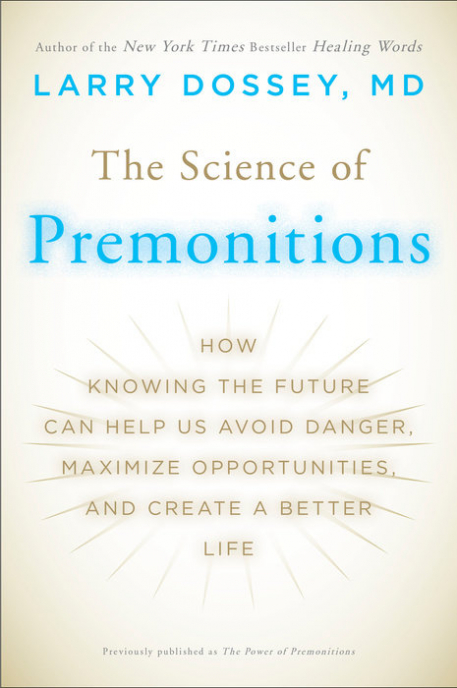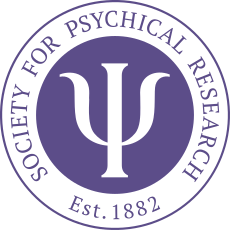
Reviewed by Gregory M. Westlake
Man has two eyes. One only sees what moves in
fleeting time, the other what is eternal and divine
[Franck, 2005]
This is a well-researched book of 199 pages of text, a 6-page appendix of fascinating quotations, 43 pages of notes, and a useful 16-page reference list. The Science of Premonitions is an important contribution to the current ‘self help’ literature on the subject of parapsychology, and the various intuitions one might have about the future, and perhaps the ‘hyperacuity of the senses’. Larry Dossey, scientist, author, physician and lecturer, has always been fascinated with the role of consciousness and spirituality in health and illness. He states that the connections between meditation and premonitions are profound, but warns that such premonitory abilities can be extremely seductive. So this ‘gift’ should be approached with wisdom and discernment, as a vital component to one’s spiritual development, for there should be an honourable, ethical reason for the individual to want to cultivate premonitions. By adapting our vision of time through new models in physics through meditative approaches we can work our way towards the possibility of premonitions. “Time,” says physicist Paul Davis, “is Einstein’s unfinished revolution.”
The book is divided into five chapters, with firstly, “The Cases”, secondly, “The Evidence”, thirdly, “An Explanation of the Premonitions”, penultimately, “The Cultivation of Premonitions”, and finally, “The Integration of Premonitions and our Worldview”. The author’s style is accessible and coherent, yet it is sufficiently scientific and scholarly to be both informative and worthwhile.
The three diseases of osteomyelitis, lung cancer and tuberculosis are mentioned as causing symptoms that provoke premonitions in the form of symbolic hyper-real, numinous dreams. Precognitive dreams are the most common psychic events to appear in the life of an average person, making up more than half of the ESP experiences people report. Evolutionary biology and the ability to assess dangers is always an advantage in the game of survival of the fittest. This skill might become internalized as part of one’s genetic endowment, and could be passed on to succeeding generations. Premonitions have frequently been connected with life-threatening future events, so those humans who possessed this sense would naturally have had a survival advantage over those who did not. Fragmentary in nature, not everybody acts on premonitions, which might be seen as a blessing in disguise to keep the ‘ecosystem’ in balance. Similarly, repressing premonitions may be a learned behaviour. For if such insights are to aid our survival, often we cannot afford the luxury of time to reflect, and intellectualize consequent actions and decision making. They skitter away if we focus on having them, and therefore should be left alone.
Musicians and artists are considered. For instance, Alex Grey the visionary artist painted Gaia in 1989, showing two planes flying over the World Trade Center buildings in a ravaged landscape. Similarly, the cover art for the CD Party Music by the alternative hip-hop group The Coup, shows the Twin Towers of the World Trade Centre detonating. The artwork was created in June 2001, but after 9/11 the release of the CD was delayed to allow new cover art to be developed. Both images are eerily precise premonitions of the horrific tragedy. Several studies provide evidence for such a relationship between artistic ability or creativity and psi performance, or psi-related experiences (PREs).
The author presents the theories of entropy, emotion and energetic change as an explanation of the premonitions of disasters, tragedies and death. Entropy is a scientific term derived from the Greek word meaning ‘transformation inside’; it is a measure of the disorder, randomness, or chaos in a system.1 Energy transmutation when a system becomes highly disorganized and destroyed, for instance in violent death, is the ultimate form of entropy, and a common theme in premonitions.
The ability to know distant or future events is often considered a fundamental, innate ability that everyone has, and which transcends our visual sense, allowing us to see beyond ourselves in space and time. Even blind persons who have had out-of-body experiences claim to see things at a distance due to a distinctive transcendental awareness known as mindsight. In medical school, Dossey was amazed at the diagnostic skills of his professors who reasoned with their ‘experience’ and ‘clinical judgement’, and he suggests there are experts in other fields who are equally adept in deploying intuitive problem-solving skills. For instance, cab drivers in London have to learn ‘the knowledge’, which includes some twenty-five thousand street names, which can take up to three years to master. Interestingly, the posterior (or rear region) of the hippocampus is often larger in taxi drivers, as demonstrated in fMRI scans. The use of GPS, or Global Positioning System, directional devices could negatively affect these observed brain changes, dumbing down our intuitive sense.
In 1773 Samuel Johnson, the great essayist, poet, biographer and lexicographer, visited the Western Isles of Scotland, as he was fascinated by reports that islanders had ‘ the second sight’, or the ability to know things beyond the usual senses. Apparently visions, voices and premonitions were always in the air. He summarized his views in the classic 1775 work, Journey to the Western Isles of Scotland. Although the book was considered to be condescending and wrong in places, seeing such psychic events as “commonly useless”, in other ways, the author was an accurate judge.
Importantly, Dossey warns that caution is wise for anyone who wants to cultivate premonitions or any other anomalous experience, as there can be an aftermath for psi-related experiences. General surveys of emotion following extrasensory experiences show anxiety, depression and only sometimes happiness. The prevailing attitude towards these phenomena can lead to fear, as the Diagnostic and Statistical Manual states that magical thinking and unusual perceptions are symptoms of ‘schizotypal personality’.
To conclude, I can recommend this book to the interested public, and as a more general book to the scientist. In presenting his research in a medical, ethical format the author has made a useful contribution to the literature on parapsychology.
References
Franck, F. (2005). Messenger of the Heart: The Book of Angelus Silesius. Bloomington: World Wisdom.
This review first appeared in the Journal of the Society for Psychical Research Vol 75(2).

